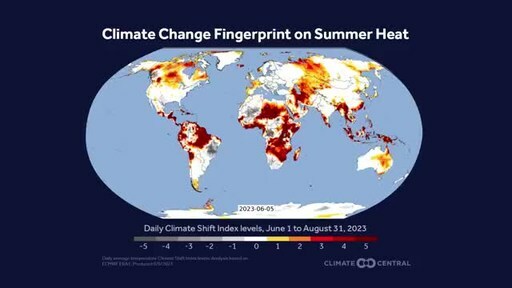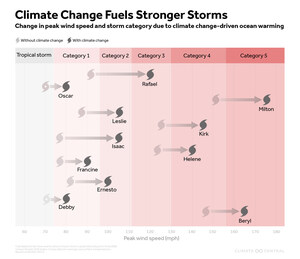Attribution analysis of temperatures in 180 countries finds the hottest northern hemisphere summer in recorded history would have been almost impossible without the influence of carbon pollution
PRINCETON, N.J., Sept. 7, 2023 /PRNewswire/ -- Not one of 180 countries and 22 territories in a Climate Central attribution analysis of global temperatures escaped the influence of climate change between June and August 2023. Approximately 7.95 billion people–98 percent of the entire human population–experienced temperatures that were made at least two times more likely by heat-trapping carbon pollution in Earth's atmosphere during the hottest northern hemisphere summer in recorded history.
During this span, 6.2 billion people experienced at least one day of average temperatures made at least five times more likely by climate change–the maximum value calculable by the Climate Shift Index, Climate Central's global attribution system. (The Climate Shift Index compares observed or forecast temperatures to those generated by models which remove the influence of human-caused climate change.) Between June and August, nearly 2.4 billion people across 41 countries or territories were exposed to more than 60 days with temperatures reaching five on the Climate Shift Index.
Nearly half of the global population–3.9 billion people–experienced 30 or more days between June and August with temperatures made at least three times more likely by climate change (corresponding to three-to-five on the Climate Shift Index). For 1.5 billion, temperatures during every day of the period reached that level.
The influence of climate change was inequitably distributed throughout the world, with residents of G20 nations exposed, on average during the period, to 17 days of temperatures made at least three times more likely. Meanwhile residents of the United Nations' Least Developed countries (47 days) and Small Island Developing States (65) were exposed to far more days of three or above on the Climate Shift Index.
"Virtually no one on Earth escaped the influence of global warming during the past three months," Dr. Andrew Pershing, Climate Central's vice president for science, said. "In every country we could analyze, including the southern hemisphere where this is the coolest time of year, we saw temperatures that would be difficult–and in some cases nearly impossible–without human-caused climate change. Carbon pollution is clearly responsible for this season's record-setting heat."
The influence of climate change for this analysis was assessed using the Climate Shift Index, which applies a peer-reviewed model- and observation-driven methodology to determine the likelihood of local, daily temperatures around the world with and without current levels of carbon pollution. The change in likelihood is scored on a five-point scale, with 1 (at least 1.5 times more likely) through 5 (at least 5 times more likely) representing temperatures made more common by climate change.
A summary of the analysis with methodology and links to the source data and localized graphics from Climate Central's Climate Matters program is available at: https://www.climatecentral.org/climate-matters/global-review-June-August-2023
About Climate Central
Climate Central is a non-advocacy, non-profit science and news organization providing authoritative information to help the public and policymakers make sound decisions about climate and energy.
SOURCE Climate Central

WANT YOUR COMPANY'S NEWS FEATURED ON PRNEWSWIRE.COM?
Newsrooms &
Influencers
Digital Media
Outlets
Journalists
Opted In






Share this article